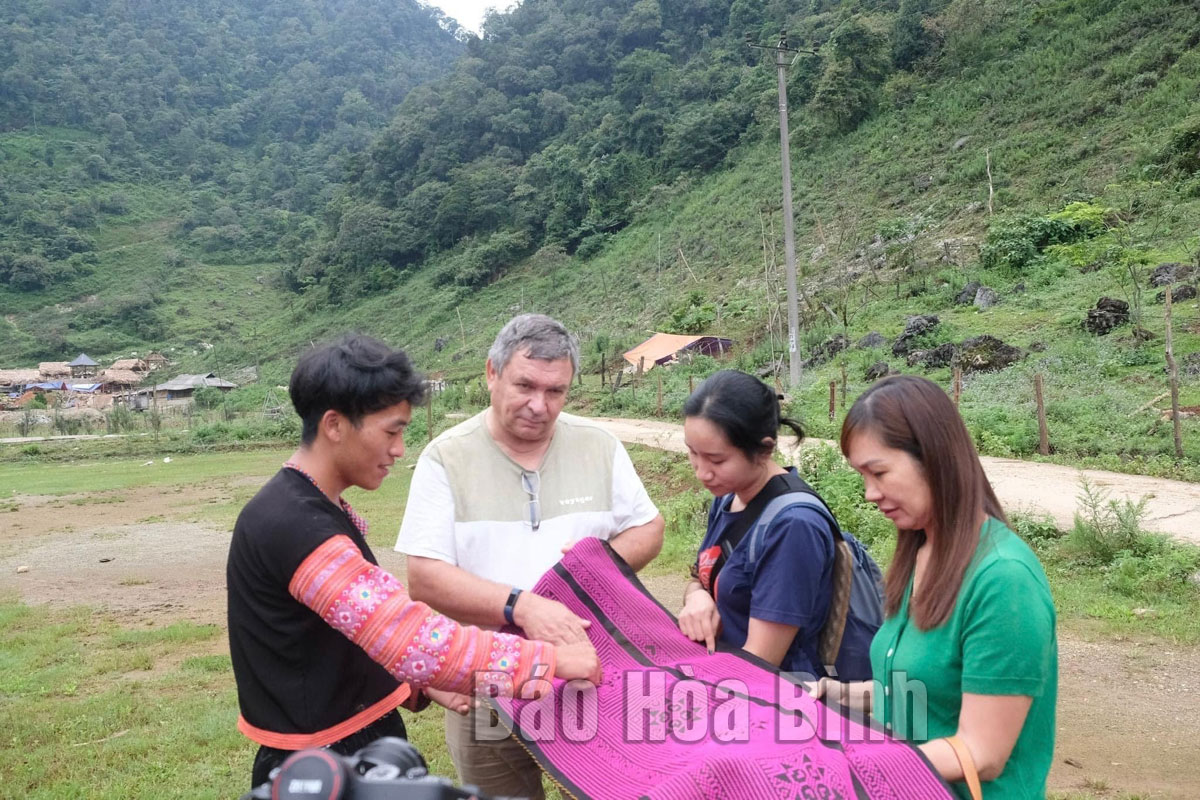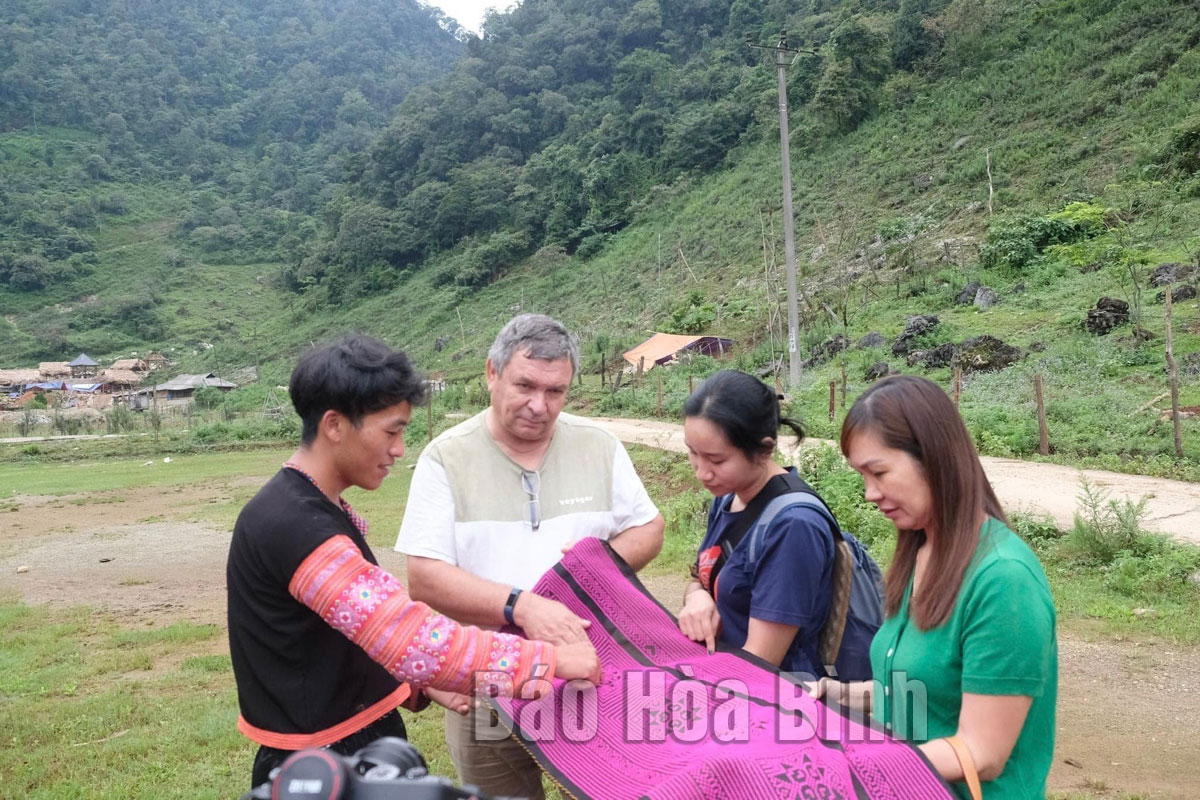
(HBO) - Hoa Binh province is giving priority to developing community-based tourism villages recognised by the "One Commune, One Product” (OCOP) programme in an effort to not only create jobs and improve rural earnings but also sustainably preserve local traditional culture.
Giang A La (far left), chairman and director of Hang Kia agriculture and
tourism services cooperative in Mai Chau introduces brocade products made by
H’mong ethnic minority people to visitors.
The diversity and human values of traditional customs of Muong, Thai, Dao,
H’mon ethnic minorities coupled with magnificent natural landscapes are paving
the way for the province to foster community-based and agricultu
ral tourism.
Many communes have been implementing the OCOP Programme to promote the brand
names and reputation of local tourism and seek partnership in boosting tourism.
Hoa Binh is now home to five OCOP-recognised community-based tourism villages
rated three to four stars. They include the villages of Hang Kia (run by Hang
Kia agriculture and tourism services cooperative - Hang Kia commune, Mai Chau
district), Lac (Lac Village agriculture, forestry and services cooperative -
Chieng Chau, Mai Chau), Da Bia (Da Bac Community-based Tourism JSC - Tien
Phong, Da Bac), Ngoi (Ngoi Hoa Tourism Investment JSC - Suoi Hoa, Tan Lac) and
Luy Ai (Phong Phu, Tan Lac).
Giang A La, chairman and director of Hang Kia agriculture and tourism services
cooperative, said in the hope of making Hang Kia an attractive destination to
both domestic and foreign travellers, the cooperative members have come up with
various exciting activities for them, for example, visiting plum orchards,
orange farms, and brocade weaving. In 2020, Hang Kia community-based tourism
village was honoured by the provincial People’s Committee as a 4-star OCOP
product. It has welcomed more than 1,000 tourist arrivals since the beginning
of this year, with revenue reaching over 1 billion VND.
Hoang Van Tuan, deputy chief of the provincial coordinating office for
new-style rural building, said in the coming time, the province will continue
to focus on developing rural and agricultural tourism services in tandem with
upholding local cultural identity and accelerating promotion of tourism,
cultural festivals, OCOP products as well as those made by craft villages.
The province also plans to increase training and upskilling in tourism
management for local officials and develop linkages among rural tourist
destinations to promote sustainability and enhance people’s livelihood, he
added./.
According to data from the Hoa Binh Provincial Party Committee, the industrial production index for the first six months of 2025 is estimated to have increased by 20% compared to the same period last year. This marks the highest year-on-year growth rate for this period since 2020.
In the first six months of 2025, Hoa Binh province’s export turnover was estimated at 1.145 billion USD, marking an 18.11% increase compared to the same period in 2024. Import turnover was estimated at $ 804 million, a 17.15% increase, which helped the province maintain a positive trade balance.
The lives of the ethnic minority farmers in Tan Lac district have gradually improved thanks to the new directions in agricultural production. This is a testament to the collective strength fostered through the professional associations and groups implemented by various levels of the district’s Farmers’ Union.
With the motto the "product quality comes first,” after nearly one year of establishment and operation, Muong village’s Clean Food Agricultural and Commercial Cooperative, located in Cau Hamlet, Hung Son Commune (Kim Boi district), has launched reputable, high-quality agricultural products to the market that are well-received by consumers. The products such as Muong village’s pork sausage, salt-cured chicken, and salt-cured pork hocks have gradually carved out a place in the market and they are on the path to obtaining the OCOP certification.
In the past, the phrase "bumper harvest, rock-bottom prices" was a familiar refrain for Vietnamese farmers engaged in fragmented, small-scale agriculture. But today, a new spirit is emerging across rural areas of Hoa Binh province - one of collaboration, organisation, and collective economic models that provide a stable foundation for production.
Maintaining growing area codes and packing facility codes in accordance with regulations is a mandatory requirement for agricultural products to be eligible for export. Recently, the Department of Agriculture and Environment of Hoa Binh province has intensified technical supervision of designated farming areas and packing facilities to safeguard the "green passport" that enables its products to access international markets.



